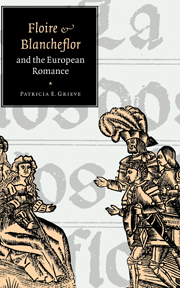Book contents
- Frontmatter
- Contents
- Preface
- Introduction
- Part One Floire and Blancheflor as Peregrinus
- Part Two The road to conversion
- 2 Cunning and ingenuity or Divine Intervention?
- 3 Signs, wonders and the telling of the tale
- 4 Routes of conversion: time and space
- 5 Generic crossroads
- Epilogue: Poetics of continuation
- Appendices
- Bibliography
- Index
- CAMBRIDGE STUDIES IN MEDIEVAL LITERATURE
2 - Cunning and ingenuity or Divine Intervention?
Published online by Cambridge University Press: 15 December 2009
- Frontmatter
- Contents
- Preface
- Introduction
- Part One Floire and Blancheflor as Peregrinus
- Part Two The road to conversion
- 2 Cunning and ingenuity or Divine Intervention?
- 3 Signs, wonders and the telling of the tale
- 4 Routes of conversion: time and space
- 5 Generic crossroads
- Epilogue: Poetics of continuation
- Appendices
- Bibliography
- Index
- CAMBRIDGE STUDIES IN MEDIEVAL LITERATURE
Summary
In the French and Middle English versions, the events of the narrative proceed linearly; the impediment to the union of Floire and Blancheflor, the pagan/Christian dichotomy, resolves itself at the end with Floire's rather nonchalant conversion. The Chronicle, Il Filocolo and, the prose romance develop on a grander scale, with a clearly cyclical – or spiral – view of history from the genealogical information at the beginning of the texts to Floire's ascent to the throne and conversion of his nation to Christianity. The reader senses from the outset that the characters participate in a Divine Plan, which enfolds the reader as well. The Old Norse version falls somewhere between these two groupings; lacking the genealogical power of the opening of Il Filocolo, for example, the story compensates for its less religious opening by the tenacity and zeal with which Blankiflúr exacts Flóres's conversion. Fleck's version also falls somewhere in between: cyclical history is not of great importance, although the birth of Flore's and Blanscheflur's daughter, Berthe, “is the gift not merely of God, but of Christ” (T. R. Jackson 23). The story develops as one of evolving and growing Christian love, and the reward of the lovers’ moral virtue.
Homiletic, or pious, romances with moral, religious or didactic features often follow one of two story-patterns: the direct intervention of God in the lives of men who are eventually saved, as in Sir Ysumbras, Sir Gowther, Robert of Sicily and Sir Cleges, and the story of persecuted women, exemplary in nature, who withstand great tribulation, as in The Erl of Tolous, Le Bone Florence de Rome, Octavian and Emaré (Mehl 120–21).
- Type
- Chapter
- Information
- 'Floire and Blancheflor' and the European Romance , pp. 53 - 85Publisher: Cambridge University PressPrint publication year: 1997



